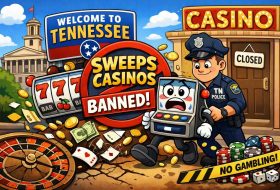
Walk into a Pennsylvania bar, veterans’ hall, or even a corner gas station, and odds are you’ll spot them. The regulars tapping away at machines that look like slots but, legally speaking, aren’t. These are “skill games,” and after years of pretending the issue might sort itself out, lawmakers in Harrisburg are finally admitting what everyone already knows: the machines are everywhere, and the state is getting nothing from them.
Senator Gene Yaw, joined by Senator Anthony Williams, says he’s preparing to drop a fresh bill that would finally put checks around the machines.
If it feels like déjà vu, that’s because Yaw already tried this once. Back in April, he introduced a bill that put a 16% tax on skill game revenue and handed regulatory duties to the Department of Revenue, with liquor control officers tasked with enforcement. On paper, it was supposed to funnel about $300 million a year into state coffers while giving businesses and veterans’ clubs a lifeline. In practice, the bill went nowhere.
Yaw’s Subscription Fix
This time around, Yaw returned with a new approach. Instead of just a revenue tax, he now wants a flat $500 monthly fee for every machine in Pennsylvania, capped at 50,000 units statewide. That change turns the whole thing into something like a subscription service where there’s steady money in the state’s pocket without putting all the burden on win rates.
He also wants local governments to set health and safety standards for where the machines can operate. The hope is that this new structure will feel more predictable to lawmakers and harder for critics to dismiss.
The Republican Playbook
Before Yaw floated his subscription-style idea, a group of Senate Republicans had already laid their cards on the table. Senate Bill 756, led by Joe Pittman — with Dan Laughlin, Rosemary Brown, Kim Ward, and Chris Gebhard — takes a tougher approach.
Their proposal calls for a 35% tax on revenue, limits machines to liquor-licensed businesses, allows four in bars and two in restaurants. It also raises the cap at truck stops from five to seven.
Casinos like this idea because they pay tax rates of about 50% on slots. Skill game makers oppose, saying the rate would crush small businesses that rely on the machines.
Pace-O-Matic and Miele Manufacturing argue for something closer to 15%. POM spokesman Mike Barley called the bill “woefully short” and warned it would take away the very money that has been helping bars and clubs keep staff and cover rising costs.
What to Watch Next?
For now, Yaw and William’s new bill is still a promise rather than a filing. They are shopping for bipartisan co-sponsors and trying to rally enough support to avoid the fate of the earlier proposal.
Casinos will almost certainly push back, arguing that these machines cut into their business without playing by the same rules. Small business owners, on the other hand, are likely to welcome any framework that brings stability without squeezing them dry.
While the court is still heated up, some of the real-money skilled games players can hop in include:





